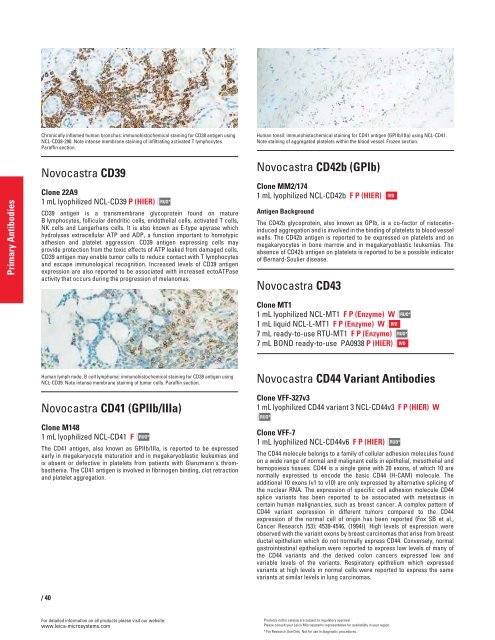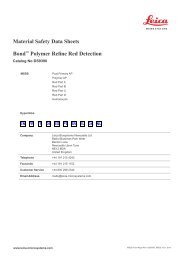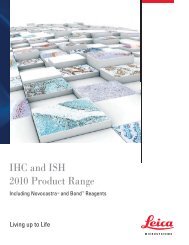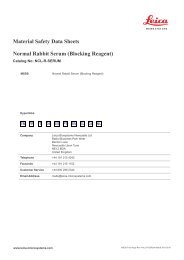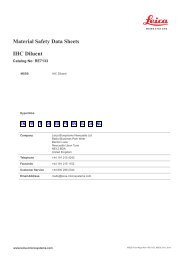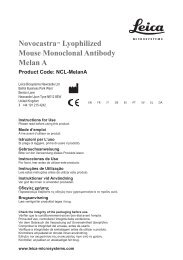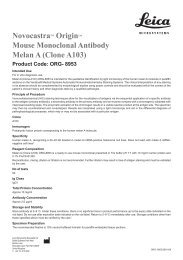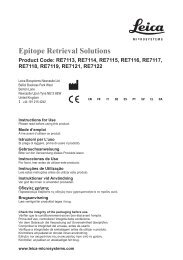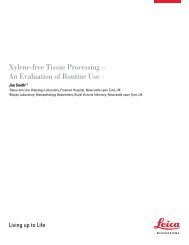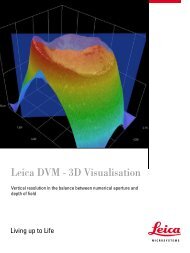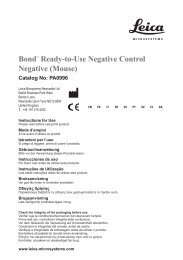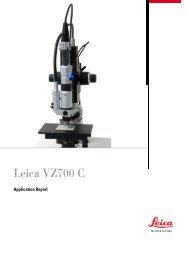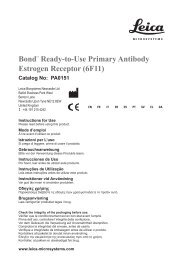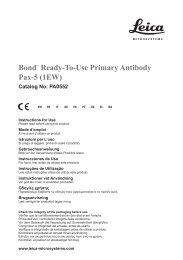QF0159 Marketing Release Record
QF0159 Marketing Release Record
QF0159 Marketing Release Record
Create successful ePaper yourself
Turn your PDF publications into a flip-book with our unique Google optimized e-Paper software.
Primary Antibodies<br />
Chronically inflamed human bronchus: immunohistochemical staining for CD38 antigen using<br />
NCL-CD38-290. Note intense membrane staining of infiltrating activated T lymphocytes.<br />
Paraffin section.<br />
Novocastra CD39<br />
Clone 22A9<br />
1 mL lyophilized NCL-CD39 P (HIER)<br />
CD39 antigen is a transmembrane glycoprotein found on mature<br />
B lymphocytes, follicular dendritic cells, endothelial cells, activated T cells,<br />
NK cells and Langerhans cells. It is also known as E-type apyrase which<br />
hydrolyses extracellular ATP and ADP, a function important to homotypic<br />
adhesion and platelet aggression. CD39 antigen expressing cells may<br />
provide protection from the toxic effects of ATP leaked from damaged cells.<br />
CD39 antigen may enable tumor cells to reduce contact with T lymphocytes<br />
and escape immunological recognition. Increased levels of CD39 antigen<br />
expression are also reported to be associated with increased ectoATPase<br />
activity that occurs during the progression of melanomas.<br />
Human lymph node, B cell lymphoma: immunohistochemical staining for CD39 antigen using<br />
NCL-CD39. Note intense membrane staining of tumor cells. Paraffin section.<br />
Novocastra CD41 (GPIIb/IIIa)<br />
Clone M148<br />
1 mL lyophilized NCL-CD41 F<br />
The CD41 antigen, also known as GPIIb/IIIa, is reported to be expressed<br />
early in megakaryocyte maturation and in megakaryoblastic leukemias and<br />
is absent or defective in platelets from patients with Glanzmann's thrombasthenia.<br />
The CD41 antigen is involved in fibrinogen binding, clot retraction<br />
and platelet aggregation.<br />
/40<br />
RUO*<br />
RUO*<br />
For detailed information on all products please visit our website:<br />
www.leica-microsystems.com<br />
Human tonsil: immunohistochemical staining for CD41 antigen (GPIIb/IIIa) using NCL-CD41.<br />
Note staining of aggregated platelets within the blood vessel. Frozen section.<br />
Novocastra CD42b (GPIb)<br />
Clone MM2/174<br />
1 mL lyophilized NCL-CD42b F P (HIER)<br />
Antigen Background<br />
The CD42b glycoprotein, also known as GPIb, is a co-factor of ristocetininduced<br />
aggregation and is involved in the binding of platelets to blood vessel<br />
walls. The CD42b antigen is reported to be expressed on platelets and on<br />
megakaryocytes in bone marrow and in megakaryoblastic leukemias. The<br />
absence of CD42b antigen on platelets is reported to be a possible indicator<br />
of Bernard-Soulier disease.<br />
Novocastra CD43<br />
Clone MT1<br />
1 mL lyophilized NCL-MT1 F P (Enzyme) W<br />
1 mL liquid NCL-L-MT1 F P (Enzyme) W IVD<br />
7 mL ready-to-use RTU-MT1 F P (Enzyme)<br />
7 mL BOND ready-to-use PA0938 P (HIER)<br />
Novocastra CD44 Variant Antibodies<br />
Clone VFF-327v3<br />
1 mL lyophilized CD44 variant 3 NCL-CD44v3 F P (HIER) W<br />
RUO*<br />
Clone VFF-7<br />
1 mL lyophilized NCL-CD44v6 F P (HIER)<br />
The CD44 molecule belongs to a family of cellular adhesion molecules found<br />
on a wide range of normal and malignant cells in epithelial, mesothelial and<br />
hemopoiesis tissues. CD44 is a single gene with 20 exons, of which 10 are<br />
normally expressed to encode the basic CD44 (H-CAM) molecule. The<br />
additional 10 exons (v1 to v10) are only expressed by alternative splicing of<br />
the nuclear RNA. The expression of specific cell adhesion molecule CD44<br />
splice variants has been reported to be associated with metastasis in<br />
certain human malignancies, such as breast cancer. A complex pattern of<br />
CD44 variant expression in different tumors compared to the CD44<br />
expression of the normal cell of origin has been reported (Fox SB et al.,<br />
Cancer Research (53): 4539-4546, (1994)). High levels of expression were<br />
observed with the variant exons by breast carcinomas that arise from breast<br />
ductal epithelium which do not normally express CD44. Conversely, normal<br />
gastrointestinal epithelium were reported to express low levels of many of<br />
the CD44 variants and the derived colon cancers expressed low and<br />
variable levels of the variants. Respiratory epithelium which expressed<br />
variants at high levels in normal cells were reported to express the same<br />
variants at similar levels in lung carcinomas.<br />
Products in this catalog are subject to regulatory approval.<br />
Please consult your Leica Microsystems representative for availability in your region.<br />
* For Research Use Only. Not for use in diagnostic procedures.<br />
IVD<br />
RUO*<br />
RUO*<br />
RUO*<br />
IVD


